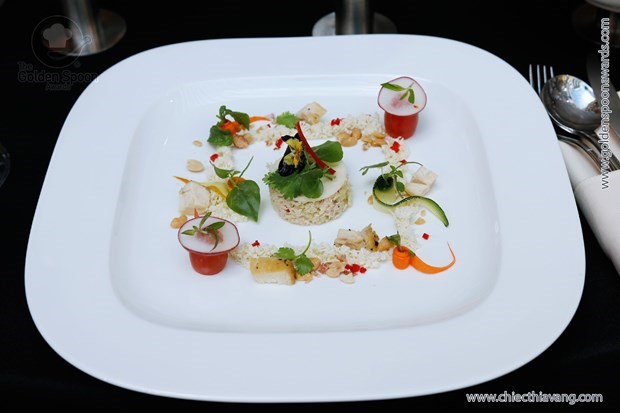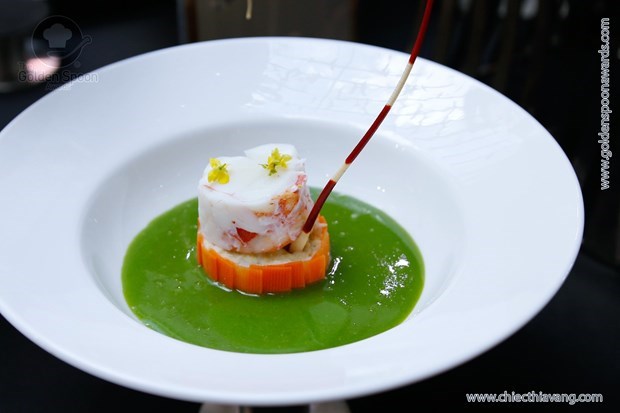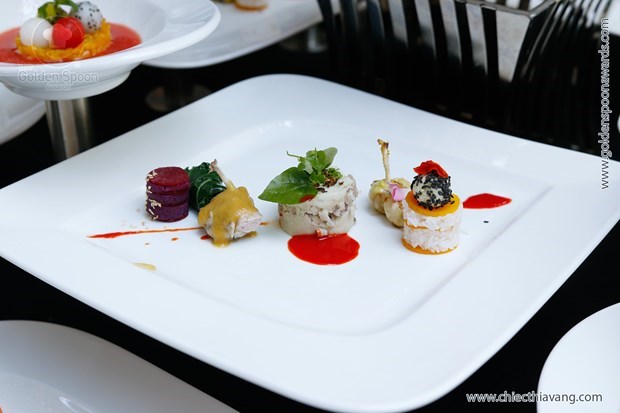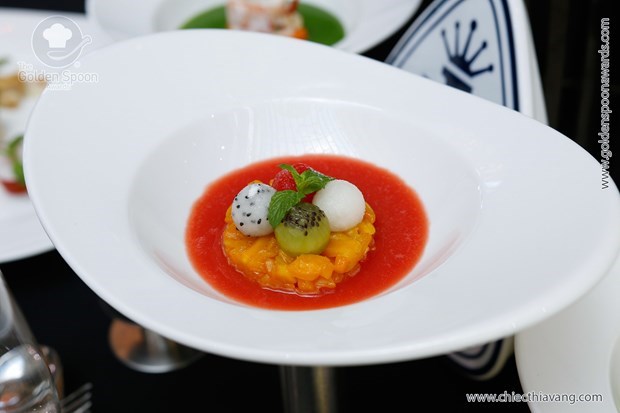A review on the idea that made Lotte Hanoi Hotel team the new winner of the Golden Spoon Awards 2015 Final with a prestigious cup of chef and 1-billion dong prize.
In
the final round, the team from Lotte Hanoi Hotel received a black box
containing secret ingredients, such as crab, chicken breast, lobster, frog,
fermented rice and ripe jackfruit. According to chef Vu Van Thanh, winner of
the Golden Spoon Awards 2015, “every contender in this competition possesses
the same skill sets and talent. However, what can make them truly stand out to
win is the knowledge of food and profound understanding of traditional
cuisine”. The key to his team’s success can be interpreted as a process of
preparing a creative menu which utilizes Vietnamese culinary fundamentals and
cultural patterns as well as flexibly incorporates with the black box content.
Below
is the flow of how the winner of the Golden Spoon Awards 2015 implemented their
menu.
Entrée – Grilled
chicken with crab and cauliflower coleslaw
As
for the dish’s meaning, the square dish embracing the circular display of the
slaw reminded us of our very first legendary cooking competition in Vietnamese
history by Prince Lang Lieu, which was briefly recounted by chef Vu Van Thanh
during the tasting session. It is a visualization of Vietnamese concept
regarding the creation of life: “sky is round, earth is square”, the
filial deity towards one’s parents since “father
is square, mother is round”, the motherhood between “round mother, square child” and the hope for succeed in “squaring
the circle”, etc.

Grilled chicken with crab and cauliflower coleslaw. Photo courtesy: T. Dzung
Recipe:
soak shredded cauliflower in cold water with a pinch of salt and vinegar. Set
the crab meat aside. Chicken breast is marinated with some spices, lime juice,
ginger juice, honey and turmeric, then grilled until cooked through. Coleslaw
dressing: lime juice, vinegar, fish sauce, sugar, garlic and hot chili blended
together in order to create a balance taste of sweet, sour, salty and hot
patterns. Next, dress the shredded cauliflower, add some roasted peanut,
sesame, peeled cherry tomato, carrot, herbs and coriander. The dish is expected
to taste crunchy, nutty, sour and sweet thanks to peanut, sesame and other
condiments.
Soup – Rice soup
with lobster and sweet leaf
Inspired
by the long-established rice agriculture and the adaptation of the
aforementioned folklore Banh Chung Banh Day, the team decided to replace wheat
flour, potato, butter, whipping cream and milk with rice to make the soup. On
the other hand, the chefs also emulated the way Vietnamese mothers cooked
porridge for their children when they started to crawl and take their very
first steps; however, the soup’s texture will be thinner than that of porridge.
The soup concept ignites the “early life” of a Vietnamese,
especially after the echo of the entrée.

Rice soup with lobster and sweet leaf. Photo courtesy: T.Dzung
Recipe:
Cut lobster head into small pieces and stir fry with scallion and ginger. Bring
water to boil before adding lotus seed and rice, reduce heat to medium low.
Peel lobster body and put in hot boiling water, add fish sauce and spices to
taste. Take out cooked lobster and set aside, purée other cooked items and
strain until smooth. Reheat the purée and add sweet leaf juice, add pepper and
seasonings to taste and serve hot.
Main course:
Three-regioned frog with red melon sauce and cham cheo served with vegetables
and rice
While
the entrée is the “creation of life” and the soup depicts the “early life”, the
main course revives the distinct customs of three different regions of the
S-shaped country. The North prefers light, tender fare. The Central Coast
boasts hot chili flavor. Meanwhile, there is a bias towards sweet and sour
tasting ingredients in the South’s food. Hence, the frog dish was created based
on those principles.

Main course: Three-regioned frog with red melon sauce and cham cheo served with vegetables and rice. Photo courtesy: T. Dzung
Following
the North style, the frog was marinated with galangal root, fermented rice,
turmeric and other spices to taste, then chargrilled.
As
for Central Coast style, dermason beans are cooked, peeled and smashed evenly.
The frogs are rubbed with rice wine and deboned before stir frying with
scallion, garlic, ginger, lemongrass and chili. At this stage, a unique sauce
would help. To make it, red melon is soaked in rice wine and water before
mixing with cham cheo (a popular condiment of Thai ethnic groups in the North).
The mixture is simmered. The sauce which is strained would taste spicy and has
a distinct flavor of cham cheo. The sauce is served with smashed dermason bean
and stir-fried frog.
In
order to recreate the South version, the frog will be processed to remove fishy
smell, then braised with pineapple juice, coconut water, coconut milk, some
herbs, then fish sauce and salt to taste. When the frog is cooked, add
culantro. The braised frog is served hot, which boosts the creaminess of
coconut milk, the sweet-sourness of pineapple juice and aroma of herbs.
Dessert –
Five-fruit sweet soup and jackfruit
By
making this dessert, the chefs would like to express their sincere gratitude to
everyone. According to chef Vu Van Thanh, during Tet holiday, it is traditional
for a Vietnamese family to prepare a platter with five different fruits to pay
tribute to their ancestor after a long year of hard work. It is also their
prayers for the coming year full of good luck since the fruit names rhymes with
prosperity, wealth, longevity, good health and peace.
“For
me, it is my own appreciation towards the competition which helps showcase my
passion for Vietnamese cuisine – the one with deepest cultural nuances and
strongest, simplest and deepest philosophy. I hope the competition will be
continued to give later generations of chefs the opportunities to learn latest
cooking methods and techniques, adapting them into available Vietnamese
condiments. Here is to brighter future of Vietnamese cuisine in the culinary
world map”, shared winner of the Golden Spoon Awards 2015.

Five-fruit sweet soup and jackfruit. Photo courtesy: T. Dzung
Recipe:
blend peeled tomatoes, passionfruit juice, Da Lat strawberry and water melon
juice. Remove jack fruit seeds before slice the flesh into cubes, sear with
honey and cinnamon. Scoop out dragon fruit, kiwi, pear and water melon balls,
mix them with mint leaf and malt syrup. Serve all at once.
By Trung Dzung